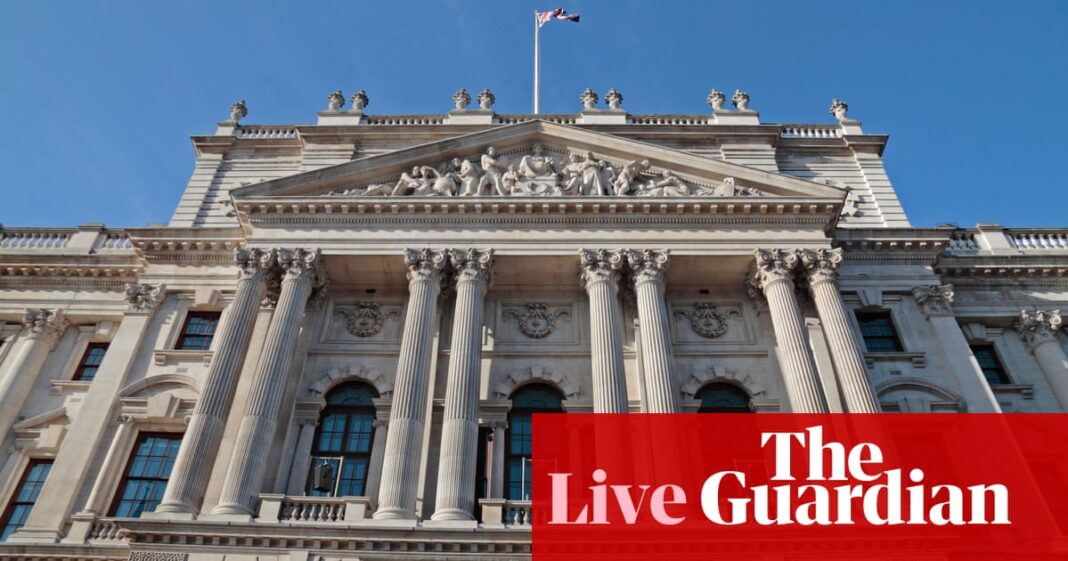Public sector pay rises lifted borrowing
Today’s UK public finances report shows that public sector pay rises helped to lift government spending faster than revenues last month.
Spending increased by £3.9bn, year-on-year, increase in spending, to £88.5bn.
That, and a hefty £9.1bn increase in debt servicing costs (see here) helped to push the UK’s monthly budget deficit up over £17bn in October.
The increase in spending included:
-
Spending on government goods and services increasing by £2.5bn to £36.9bn, as “pay rises and inflation increased running costs”
-
Net social benefits paid by central government increasing by £0.5bn to £25.3bn, due to inflation-linked increases in benefits
Pay awards for public sector workers in Britain are set to overtake the private sector for the first time in four years, after Rachel Reeves’s budget at the end of October confirmed above-inflation pay rises for public sector workers.
On the other side of the ledger, government revenues increase by £2.9bn last month, compared with October 2023.
Tax receipts jumped by £3.8bn, to £61.3bn, including a £1.5bn rise in Corporation Tax receipts and an extra £1.4bn from Income Tax.
But ‘compulsory social contributions’ fell by £1.1bn, mainly due to the reductions in the main rates of National Insurance in early 2024 made by former chancellor Jeremy Hunt.
Key events
Back in UK retail, there’s more drama at fast fashion company Boohoo.
Boohoo has appointed a new chairman, Tim Morris, this morning, succeeding co-founder Mahmud Kamani.
Boohoo, which has just raised £39.3m from investors, says Morris’s appointment shows it will “continue to uphold high standards of corporate governance.”
Kamani will move to become executive vice chair, Boohoo says, explaining:
The Board has decided to divide the [Kamani’s] role between his executive capacity and his role as the Board’s chair, to enable the Company to have an independent Chair and allow Mahmud to continue his day to day executive role.
Mahmud is an integral part of the leadership team and is currently focussed on the Group’s young fashion businesses.
But Boohoo’s largest shareholder, Mike Ashley’s Frasers Group, demanded this morning that Kamani “must go”.
Frasers, which recently attempted to install Ashley as Boohoo’s CEO, has today requisitioned a further shareholder meeting of Boohoo to give shareholders the opportunity to remove Kamani as a director of Boohoo.
It told the City:
Frasers urges boohoo shareholders to vote to appoint Mr. Ashley and Mr. Lennon as directors of boohoo at the shareholder meeting which Frasers has requisitioned, with a meeting date set for Friday 20 December 2024. Frasers also urges shareholders to vote for the removal of Mr. Kamani when the Board convenes a separate shareholder meeting
With the threat of a new trade war with the US looming, China’s commerce ministry has announced a series of policy measures aimed at boosting the country’s foreign trade.
The measures include pledging to strengthen financing support to firms and expand exports of agricultural products.
Reuters has the details:
China will encourage financial institutions to provide more products to help firms improve their currency risk management, and to strengthen macro policy coordination to keep the yuan “reasonably stable”, the ministry said in a statement published online.
The country will also expand exports of agricultural products and support imports of core equipment and energy products, the statement said.
“(We will) guide and help firms to actively respond to unreasonable trade restrictions by other countries and create a good external environment for exports,” according to the statement..
Germany’s financial sector faces a danger of rising corporate insolvencies, and risks in the commercial real estate sector, its central bank has warned today.
The Bundesbank says Germany faces “elevated risk stemming from commercial real estate and owing to structural and climate change”, in its latest financial stability report.
It fears that Germany’s non-bank financial intermediaries continue to face liquidity risk, as “losses on commercial real estate loans have gone up considerably”.
Michael Theurer, member of the Executive Board of the Deutsche Bundesbank, says:
“The financial system is facing acute challenges due to geopolitical tensions and a weak economy. The economy is also undergoing transformation. This is making supervisors more vigilant, particularly with regard to the commercial real estate sector.
Our top priority must be a resilient financial system.”
Following the budget, more UK companies are worried about taxation.
The latest realtime data from the Office for National Statistics shows that the proportion of firms who say taxation is their main concern has risen to 14%, up from 10% last month.
That follows the increase in employers’ national insurance contributions, which has upset UK businesses.
But the most reported main concern was falling demand of goods and services, which was cirted by 16% of companies.
The ONS also found an increase in gloominess about trading prospects:
More than one in five (22%) trading businesses reported that they expect their turnover to decrease in December 2024, up 6 percentage points from expectations for November 2024; meanwhile 50% of businesses reported that they expect turnover to stay the same, down 7 percentage points over the same period.
According to the latest Business Insights and Conditions Survey (4 to 17 Nov 2024):
· 16 % of trading businesses said their turnover had increased in Oct 2024 compared with Sept 2024
· 22% said it had decreasedRead our release ➡️ https://t.co/n9HxNzXQcX pic.twitter.com/4fTG5zV09b
— Office for National Statistics (ONS) (@ONS) November 21, 2024
The jump in UK borrowing last month (see opening post) makes it hard for Rachel Reeves to reverse any of the unpopular tax decisions in last month’s budget, says Sandra Horsfield, economist at Investec:
Certainly, the pressure on public finances looks here to stay, unless the Chancellor receives unexpectedly good news on growth and therefore tax revenues in future.
Tempting though it may be politically to reverse some of the more unpopular decisions taken in the Budget, Labour’s hands to do so, without offsetting other unpalatable choices, look tied for now.
JD Sports shares slide after warning on profits
Shares in UK retailer JD Sports have tumbled to their lowest level in over two years, after it hit the City with a warning that profits will be lower than hoped this year.
JD Sports told shareholders that it has been hit by “much softer consumer demand and trading” in recent weeks, afer a strong back-to-school period.
The company blames elevated promotional activity, unseasonable weather and a cautious consumer, including suppressed demand in the US ahead of the election.
JD now expects pre-tax profits to only reach the lower end of its original guidance range of £955, to £1.035bn.
Régis Schultz, CEO of JD Sports Fashion, said:
“After a good start to the period, helped by strong back-to-school sales, we saw increased trading volatility in October, particularly in North America and the UK, reflecting elevated promotional activity and mild weather.
Against this backdrop, we maintained our commercial discipline, improving gross margin by 0.3%pts while still delivering 5.4% organic sales growth. In addition, we made further, strong progress on our long-term growth strategy including opening 79 new JD stores across the world.
We have performed well in the key trading events this year and we are well positioned for the upcoming peak season. The trading environment remains volatile though and, following October trading, we now anticipate full year profit to be at the lower end of our guidance range.”
Shares are down 16% at 94.5p, their lowest level since October 2022, at the bottom of the FTSE 100 leaderboard.
Investors forced to pay for ‘undeserved’ bonuses at three water suppliers

Jasper Jolly
Shareholders at Thames Water, Yorkshire Water, and Dŵr Cymru Welsh Water will be forced to pick up the tab for executive bonuses after the water regulator determined that the sector had awarded “undeserved” extra payments worth £6.8m.
Ofwat said on Thursday that it had used new powers to ensure shareholders at the three companies paid for bonuses because they had not “adequately reflected overall company performance issues”.
Water companies have faced a wave of public anger and political backlash in recent years over leaks and sewage overflows as they have also come under increasing financial strain.
Nine water companies will not be allowed to use customer funds to pay bonuses worth £6.8m. Six voluntarily said that shareholders would pay, but Ofwat had to use its powers directly in the cases of bonuses worth £1.5m from Thames, Yorkshire and Welsh.
More here.
So far this financial year (since April) the UK has borrowed £96.6bn, £1.1bn more than at the same point in the last financial year.
That’s the third highest financial year-to-October borrowing since monthly records began in January 1993.
Alison Ring, ICAEW director of public sector and taxation, says this “emphasises the difficult financial situation” facing the UK government, adding:
“With the government’s growth agenda including planning reform and a fresh industrial strategy yet to be rolled out, let alone bear fruit, the Chancellor is almost entirely relying on her Autumn Budget tax rises to stabilise the fiscal situation from April 2025 onwards.
This is likely to stiffen her resolve against calls for her to reverse course on some of her tax decisions.”
Inheritance tax raises £5bn since April
Inheritance tax has brought in £5bn so far this financial year, even before the government hits farmers with the levy.
New figures from HMRC this morning show that inheritance tax receipts for April to October 2024 have risen by £500m year-on-year, to £5bn.
This increase is driven by “higher volumes of wealth transfers following recent IHT-liable deaths”, says HMRC, with the increase in values of assets such as homes and share portfolios meaning more estates are worth more than the IHT thresholds.
Fiscal drag is also pushing more estates into the IHT territory, as those thresholds have been frozen for several years.
Helen Morrissey, head of retirement analysis at Hargreaves Lansdown, says:
“Inheritance tax is on track for another record year with receipts so far hitting £5bn. With five months of the tax year yet to go it should easily outstrip last year’s £7.5bn.
It may be a tax that so far only hits a small proportion of the population but, after last month’s Budget, it’s about to be an issue for a lot more people, after the decision was taken to make pensions part of someone’s estate for inheritance tax purposes. This won’t kick in until 2027 but will be a major part of many people’s financial planning.
UK spent £9.1bn on debt servicing costs last month
Over half last month’s borrowing went on servicing the UK’s national debt!
The public finances report shows that the interest bill on UK government debt increased by £0.5bn to £9.1bn, last month.
The increase was mainly due to rises in the Retail Prices Index (RPI) measure of inflation, which sets the repayment rates on index-linked gilts.
So far this financial year, the UK has spent £53.6 billion on debt interest, a £2.2bn drop on a year ago.
Public sector pay rises lifted borrowing
Today’s UK public finances report shows that public sector pay rises helped to lift government spending faster than revenues last month.
Spending increased by £3.9bn, year-on-year, increase in spending, to £88.5bn.
That, and a hefty £9.1bn increase in debt servicing costs (see here) helped to push the UK’s monthly budget deficit up over £17bn in October.
The increase in spending included:
-
Spending on government goods and services increasing by £2.5bn to £36.9bn, as “pay rises and inflation increased running costs”
-
Net social benefits paid by central government increasing by £0.5bn to £25.3bn, due to inflation-linked increases in benefits
Pay awards for public sector workers in Britain are set to overtake the private sector for the first time in four years, after Rachel Reeves’s budget at the end of October confirmed above-inflation pay rises for public sector workers.
On the other side of the ledger, government revenues increase by £2.9bn last month, compared with October 2023.
Tax receipts jumped by £3.8bn, to £61.3bn, including a £1.5bn rise in Corporation Tax receipts and an extra £1.4bn from Income Tax.
But ‘compulsory social contributions’ fell by £1.1bn, mainly due to the reductions in the main rates of National Insurance in early 2024 made by former chancellor Jeremy Hunt.
Bitcoin closes in on $100,000
Bitcoin is heading close to the $100,000 mark for the first time, after hitting the latest in a series of record highs.
The world’s largest cryptocurrency has jumped to around $97,902 in early trading, meaning it has surged by 132% so far this year.
Bitcoin has rallied from below $70,000 since Donald Trump won the US presidential election two weeks ago, with traders calculating that the next administration will be more friendly towards crypto.
Trump recently pledged to make the United States the crypto capital of the world, and Bloomberg reported last night that the president-elect’s team is holding discussions with the digital asset industry about whether to create a new White House post solely dedicated to cryptocurrency policy.
Stephen Innes, managing partner at SPI Asset Management, says:
Meanwhile, Bitcoin is inching closer to a monumental $100,000 milestone, driven by mounting confidence that President-elect Donald Trump’s administration will usher in a crypto-friendly era.
Speculators rally behind the narrative, fueling a frenzy as the digital asset edges toward an unprecedented valuation.
‘Disappointing’ borrowing figures highlight Chancellor’s lack of wiggle room
October’s “disappointing” public finances figures underline the fiscal challenge that the Chancellor still faces, despite the big increases in spending and taxes announced in the Budget.
So says Alex Kerr, UK economist at Capital Economics, who warns that Reeves may need to make further tax rises in future years if she wants to increase spending.
Kerr tells clients this morning:
Overall, October’s borrowing figures underline the little wiggle room the Chancellor has to significantly increase day-to-day spending.
Despite raising day-to-day spending significantly this year and next, spending is set to rise by just 1.3% in real terms on average between 2026/27 and 2029/30.
And given that the Chancellor only had £9.9bn of fiscal ‘headroom’ against her fiscal mandate left over after October’s Budget, this suggests that if she does want to increase day-to-day spending further, taxes will probably need to rise too.
Introduction: UK borrowing jumps to £17.4bn in October
Good morning, and welcome to our rolling coverage of business, the financial markets and the world economy.
The UK government borrowed billions of pounds more than expected last month, adding to the pressures on chancellor Rachel Reeves.
Government borrowing jumped to £17.4bn in October to cover the difference between public sector spending and income, according to the first assessment of the public finances since last month’s budget.
That’s £1.6bn more than in October 2023 and the second highest October borrowing since monthly records began in January 1993.
City economists had expected a rather smaller borrowing figure, of around £12.3bn for October, after the UK borrowed over £16bn in September.
ONS deputy director for public sector finances Jessica Barnaby says that government spending – on services, and also on debt repayments – rose faster than tax receipts:
“This month’s borrowing was the second highest October figure since monthly records began in January 1993.
Despite the cut in the main rates of National Insurance earlier in 2024, total receipts rose on last year. However, with spending on public services, benefits and debt interest costs all up on last year, expenditure rose faster than revenue overall.”
Public sector net borrowing excluding public sector banks was £17.4 billion in October 2024, £1.6 billion more than this time last year and the second highest October borrowing since monthly records began in January 1993.
Read more ➡️ https://t.co/t46AiAM8oT pic.twitter.com/E0n8pWIIFJ
— Office for National Statistics (ONS) (@ONS) November 21, 2024
The increase in borrowing lifts the UK’s public sector net debt to 97.5% of GDP, levels last seeen in the early 1960s.
But, if you use the new measure of public sector net financial liabilities (persnuffle), used by Reeves in her new fiscal rules, the national debt is smaller, at 83.7% of GDP.
Public sector net financial liabilities excluding public sector banks were £2,394.3 billion at the end of October 2024, equivalent to 83.7% of GDP, 2.5 percentage points more than a year earlier. pic.twitter.com/AIcVXem1Qr
— Office for National Statistics (ONS) (@ONS) November 21, 2024
The tax rises in Labour’s budget last month should help push down borrowing, expect they are being resisted by UK retailers, and farmers.
Chief Secretary to the Treasury Darren Jones says the government is committed to stabilising the public finances:
“We inherited a £22 billion black hole in our public finances from the previous government. At the Budget we addressed this, fixing the foundations and putting public finances on a sustainable footing to rebuild the country.
“This government will never play fast and loose with the public finances. Our new robust fiscal rules will deliver stability by getting debt down while prioritising investment to deliver growth.”
The agenda
-
7am GMT: UK public finances for October
-
11am GMT: CBI industrial trends report for October
-
1.30pm GMT: US weekly jobless claims
-
1.30pm GMT: Philadelphia Fed manufacturing index
-
3pm GMT: eurozone consumer confidence report


